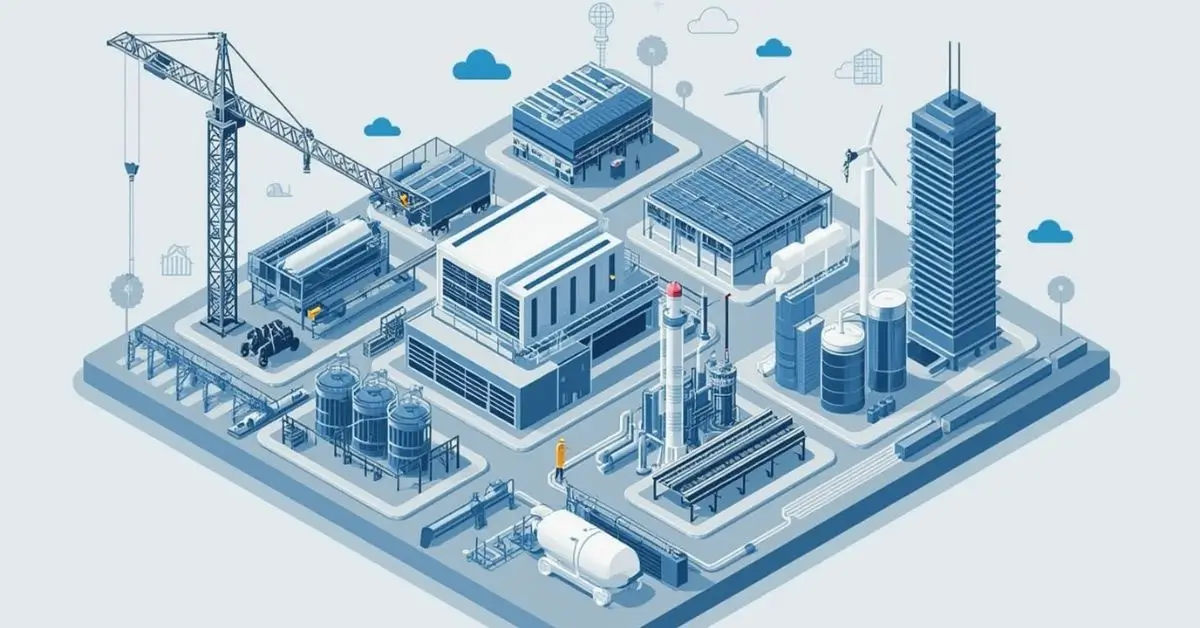If you are an engineering student, project manager, investor, or policymaker, you may have heard the term EPC industry but wondered what it truly means in practice. EPC stands for Engineering, Procurement, and Construction—a project delivery model widely used in large-scale sectors like oil and gas, energy, petrochemicals, and infrastructure.
Understanding what is EPC industry is crucial because it defines how multi-billion-dollar projects are executed, who holds responsibility, and how risks are managed. For students, it opens career opportunities. For executives, it shapes investment decisions. And for regulators, it sets compliance benchmarks.
This guide explains the EPC sector, its business model, advantages, challenges, and future trends with clarity and authority.
What Is EPC Industry in Construction and Energy?
The EPC industry is a specialized sector within the engineering and construction industry that delivers large-scale projects through a single contract. Under an EPC contract, one contractor is responsible for:
- Engineering – designing technical plans, layouts, and systems.
- Procurement – sourcing all equipment, materials, and technology.
- Construction – building, assembling, and commissioning the project.
This EPC business model provides clients with a turnkey solution, meaning the completed project is ready for immediate use.
How Does the EPC Industry Work?
The process involves several key stages:
- Feasibility & Design – EPC companies collaborate with clients to design the project scope.
- Procurement & Logistics – sourcing of machinery, materials, and technology.
- Construction & Assembly – on-site execution of the project.
- Testing & Commissioning – ensuring the plant, facility, or infrastructure meets specifications.
- Handover – client receives a fully functional project.
This approach minimizes client involvement in day-to-day operations and transfers most risks to the EPC contractor.
Difference Between EPC and Turnkey Projects
Many people confuse EPC contracts with turnkey projects. While both deliver a complete facility:
| Aspect | EPC Contract | Turnkey Project |
|---|---|---|
| Scope | Covers engineering, procurement, and construction | Can include financing and operations |
| Risk Allocation | Primarily on EPC contractor | Broader, sometimes includes financing risks |
| Common Use | Energy, oil & gas, infrastructure | Mega projects with financing needs |
Role of EPC Industry in Oil and Gas Projects
The oil and gas sector is one of the largest beneficiaries of the EPC contract industry. From refineries to pipelines and offshore rigs, EPC engineering firms handle:
- Design of complex processing plants
- Procurement of specialized equipment
- Construction under strict safety regulations
According to the International Energy Agency (IEA), global oil and gas infrastructure spending relies heavily on EPC services to ensure efficiency and compliance (IEA, 2024).
EPC Industry Meaning and Examples
Examples of EPC projects include:
- Energy plants (solar, wind, nuclear, hydro)
- Petrochemical facilities
- Transportation infrastructure (bridges, airports, highways)
- Industrial plants
Top EPC companies in the world include:
- Bechtel (USA)
- Fluor Corporation (USA)
- Technip Energies (France)
- Larsen & Toubro (India)
- Saipem (Italy)
(Source: Engineering News-Record (ENR) 2024 Rankings).
Benefits of EPC Contracts for Infrastructure
For investors and governments, the EPC construction industry offers:
- Single point of responsibility – reduces disputes.
- Time-bound delivery – project deadlines are contractually fixed.
- Risk transfer – contractor absorbs risks of cost overruns and delays.
- Efficiency – streamlined project execution.
EPC Industry vs Traditional Contracting
| Factor | EPC Industry | Traditional Contracting |
|---|---|---|
| Responsibility | Single contractor | Multiple contractors |
| Risk Management | Centralized | Shared or unclear |
| Cost Control | Fixed price | Variable |
| Delivery | Turnkey project | Multiple stages/agreements |
EPC Industry Growth and Future Trends
The global EPC sector is expanding rapidly due to:
- Energy transition – demand for renewable energy projects.
- Digitalization – AI, BIM (Building Information Modeling), and IoT integration.
- Infrastructure spending – urbanization driving new projects.
According to McKinsey & Company (2025), the EPC industry will see annual growth of 6–7%, with renewable energy EPC projects leading the surge.
Challenges in the EPC Industry
Despite its advantages, the EPC contract industry faces challenges such as:
- Cost inflation – rising material and labor costs.
- Regulatory hurdles – especially in energy and environmental compliance.
- Geopolitical risks – affecting global supply chains.
- Project complexity – mega projects often exceed planned budgets.
FAQ’s
What is EPC industry in construction?
It is a sector where companies deliver complete projects—design, procurement, and construction—under one contract.
How does the EPC industry work?
The contractor manages design, sourcing, building, and project delivery, offering a turnkey solution.
What is the difference between EPC and turnkey projects?
EPC focuses on engineering, procurement, and construction, while turnkey may also include financing and operations.
What is the role of EPC industry in oil and gas projects?
It provides end-to-end solutions for refineries, pipelines, and plants, ensuring safety and efficiency.
Who are the top EPC companies in the world?
Bechtel, Fluor, Technip Energies, L\&T, and Saipem are among the leaders.
What are the challenges in the EPC industry?
Cost overruns, supply chain disruptions, and complex regulations are common hurdles.
Conclusion
The EPC industry is a cornerstone of modern infrastructure and energy development. By consolidating engineering, procurement, and construction under a single framework, it offers efficiency, accountability, and reduced risk for clients. Whether you are an engineering student exploring career options, an investor evaluating industrial opportunities, or a policymaker setting regulations, understanding what is EPC industry equips you with the knowledge to make informed decisions.
Liam is a freelance writer, blogger, and digital media journalist. He has a management degree in Supply Chain & Operations Management and Marketing and boasts a wide-ranging background in digital media.











